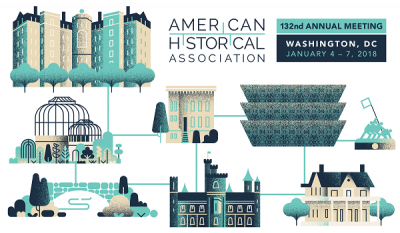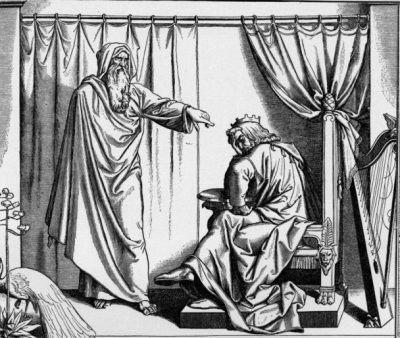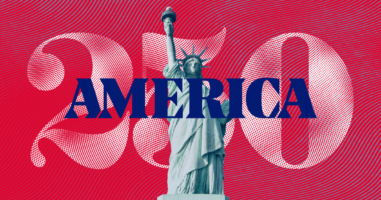
The annual conference of the American Historical Association will be held January 3-6, 2019, in Chicago. I will not be attending the conference. I have reviewed the program book and there are many sessions which are of value to history organizations, municipal historians, and educators. Below are the abstracts of these sessions. If someone is attending the conference and would like to report on them to the history community, that would be appreciated.
This post focuses on sessions related to education.
On the Front Lines of History: Educators at History Museums, Archives, and Historic Sites
Chair: Annie Polland, American Jewish Historical Society (and formerly at the Tenement Museum)
Panel: Maria Marable-Bunch, National Museum of the American Indian, Smithsonian Institution
Emily Potter-Ndiaye, Mead Art Museum
K. Allison Wickens, George Washington’s Mount Vernon
Lauren Zalut, Eastern State Penitentiary Historic Site
Comment: Annie Polland, American Jewish Historical Society
Session Abstract
As boundaries between public and academic history break down, there is increasing acknowledgement of the role that museums, historic sites, and archives play in teaching history to broad and diverse audiences. Yet many focus on the role of curators in shaping historical narratives, overlooking the essential role played by education staff at public history sites. According to the American Alliance of Museums, approximately 55 million students visit museums in school groups alone each year. Museum educators also shape the work of teachers and educators, the general public, scholars and content specialists, and many more.
This panel brings together experienced leaders in the field of museum education to examine the integral role that educators play in teaching historical content and the practice of history at museums, historic sites, and archives. Panelists will analyze different models of museum education in various contexts, consider the intellectual, administrative, and pedagogical challenges and opportunities that educators and administrators face daily, and propose new methods of collaboration between public history and academia.
Educators often serve as the main point of contact between an institution and many different publics – K-12 educators, K-12 and college students, general visitors, tour attendees, and others. The panel will discuss the pluses and pitfalls that arise in “translating” an institution’s exhibitions, documents, objects, and mission to diverse audiences. It will lay out different models of educator training and content oversight that leading institutions have adopted, and discuss institutions are best able to support the training of education staff. It will consider the essential role that educators play in making history accessible to underserved audiences – especially school-age children. It will analyze the key role educators play in communicating audience needs to the content specialists. It will highlight challenges that administrators at institutions of different sizes face when advocating for equitable compensation and treatment of often part-time education staff. Finally, panelists will suggest modes of partnership between public history educators and academic historians, and consider key lessons that academic historians can learn from the practices of the field of museum education.
Creating Connections: Historical Scholarship and the K-12 Classroom
Chair: Rachel B. Reinhard, University of California, Berkeley
Panel: Angela D. LeBlanc-Ernest, Tracye A. Matthews, filmmaker and independent scholar, University of Chicago
Nikki D. Mandell, University of Wisconsin–Whitewater
Don Romesburg, Sonoma State University
Session Abstract
Scholars and K-12 educators have long worked in isolation from one another. More recently, historians have sought ways to inform, through the most recent academic scholarship, the historical questions that are asked and narratives that are shared in elementary and secondary classrooms. This panel will share three distinct efforts that have 1) advocated for the expansion of topics included in state standards, 2) compiled usable resources for educators, and 3) developed curated and contextualized source sets for use in K-12 classrooms. Don Romesburg, who recently has been recognized by the AHA for his role in ensuring a fuller implementation of the FAIR Act, a California law which was passed in 2011 to incorporate LGBT history and the history of people with disabilities into K-12 US History curriculum, will discuss how scholars reviewed the existing History-Social Science Standards in California, revised them based on recent scholarship on gender and sexuality, and followed the governmental process of adoption of the state’s new History-Social Science Framework. Angela LeBlanc-Ernest and Tracye A. Matthews represent the leadership team of the Intersectional Black Panther Party History Project. These scholars of the Black Panther Party wanted to increase instruction around the role of women in the Black Panther Party. Through the creation of a website and compilation of resources, in addition to public events for educators, they have made a broad array of vetted resources available to educators across the country. Nikki Mandell has led an effort from within the Labor and Working Class History Association to increase instruction of the history of labor in K-12 classrooms. LAWCHA members have begun creating source sets that can be easily accessed by teachers to increase explicit instruction around labor history. Additionally, Mandell has convened labor historians to identify opportunities, parallel to the passage of the FAIR Act in California, in which scholars can inform and broaden instruction in the history of labor.
Collectively, these individual efforts attest to the academy’s commitment to informing meaningful history instruction in the K-12 classroom and offer models to other scholars with regard to how their research can influence broader audiences. Rachel B. Reinhard, the director of the UC Berkeley History-Social Science Project, which seeks to bridge the K-16 continuum through its location in the Department of History at UC Berkeley and their programming for K-12 teachers in the Bay Area, will chair the panel. This program would appeal to scholars who are interested in public applications for their scholarship and in developing partnerships with the K-12 community.
K-12 Educators’ Workshop: History in Your Backyard: Remembrance and Commemoration
Organized with the Library of Congress
What is the relationship between remembrance and commemoration? What roles do monuments and memorials in our communities play in both reflecting our collective past and allowing us to engage with it? This interactive workshop will begin with a keynote by Adam Rothman, Georgetown University, on research he is conducting at the Library of Congress (LOC) as a Kluge Fellow. This will be followed by a primary source analysis workshop conducted by Rothman and Lee Ann Potter and Kaleena Black of the Library’s new Center for Learning, Literacy, and Engagement, drawing on documents in a variety of media from the collections of the Library.
No charge; because space is limited, free advance registration is required.
Across the K-16 Continuum: Collaborative Conversations and Possibilities for History Education
Chair: Sarah Gold McBride, University of California, Berkeley
Panel: Daniel Diaz, University of California, Los Angeles
Whitney Snow, Midwestern State University
Robert B. Bain, University of Michigan
Angela La Torre, Mt. Diablo Unified School District
Session Abstract
This roundtable will discuss the benefits of sustained collaboration between scholars, practitioners, and teachers from K–12 and postsecondary settings. Panelists will share their experiences creating and participating in networks between educators working in different settings, and the opportunity for these partnerships to transform history education for students at all levels, including doctoral students. The conversation will include panelists’ reflections on one example of this type of partnership: the Teaching History Conference, a network of educators dedicated to engaging in collaborative conversations about teaching history across the K–16 continuum. The Conference, first held at UC Berkeley in 2015, leverages the teacher network of the California History–Social Science Project (CHSSP) and builds on the American Historical Association’s Career Diversity for Historians initiative. These partnerships create a unique opportunity for participants to foster a community of practice among history educators from a wide range of schools, colleges, and universities.
In the next post, I will present sessions related to civics.





